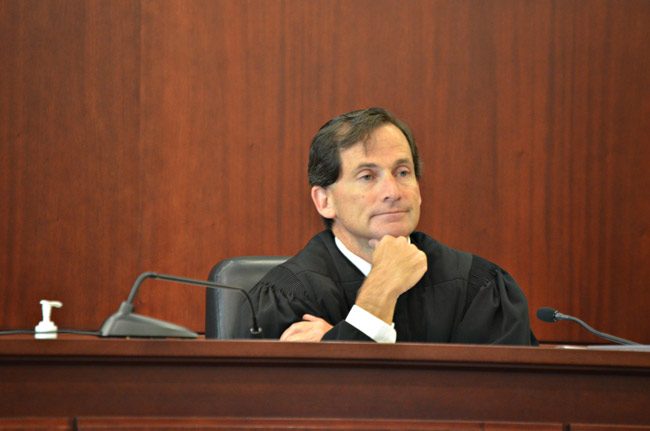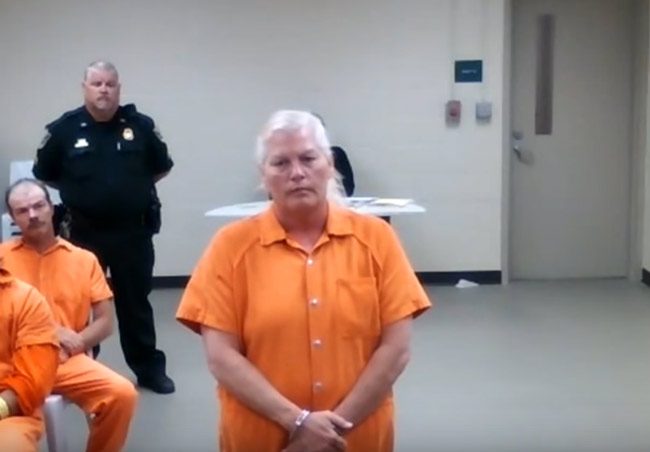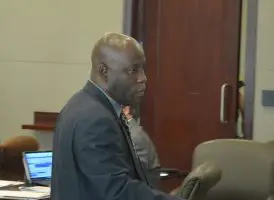
Judges are not in the habit of declaring anyone or anything, including crime labs, infallible. Circuit Judge Dennis Craig came close to doing so on two occasions in the run-up to the trial of Dorothy Singer, the west Flagler woman accused of murdering her husband and burying him under a boat in the back yard last year. The trial is scheduled to start with jury selection Monday (May 14).
On April 25 in open court and again on May 4 in a phone conversation with the defense attorney in the context of a hearing—a hearing not noted in the court docket as having ever taken place—Craig made statements that rejected the possibility that the state’s crime lab could make “a colossal mistake” as to the origins of blood being tested, and questioned how under any scenario the blood found could be that of anyone other than Charles Singer, the murder victim.
“If the FDLE expert is that bad, we might need to get a new lab,” the judge told Junior Barrett, Singer’s attorney, during docket sounding on April 25, one of the several statements the attorney found startling.
On Wednesday, Barrett filed a motion to disqualify Craig from the trial, questioning his impartiality. As startling as Craig’s statements were, so was Barrett’s motion, which appears to be a first in Craig’s tenure on Flagler’s felony bench in a major case. Ironically, this was to be Craig’s last murder trial here: he is being reassigned to felony court in Volusia at the beginning of June.
Barrett, of course, could be grandstanding, or attempting a hail Mary of a ploy to get the delay he desperately asked for two weeks ago, and did not receive. He requested the delay in part because, as he acknowledged in court, he had made a colossal assumption of his own and based his entire trial strategy on that assumption, and on what Singer had told him. His due diligence, in other words, was self-limited.
The whole issue revolves around blood the FDLE analysis found on the headboard of a bed in a bedroom at the Singer home. It was human blood. Barrett said it could not possibly be. He had assumed it would not be, and developed an entire strategy on the impossibility that there would be human blood on the headboard. Why? Because Singer told him that she had not killed her husband in that bedroom, and because she had told him that it was self-defense during an argument (an odd theory, given that Charles Singer was shot three times in the top of the head, once to the temple, once to the chest, according to the Flagler County Sheriff’s investigation.)
Barrett made those about Singer’s revelations statements in court during that April 25 docket sounding (the last step before trial)—startling revelations of his own, which included the unraveling of his entire defense strategy. The prosecutor stood next to him, taking the unexpected gift all in with many days yet to prepare her rejoinder.
So Craig had ample reasons to question Barrett and even question his motives, since Barrett was now asking for time to make up for what amounts to a strategic error in his preparation: he’d never asked the FDLE analyst, during a deposition, any questions pertaining to the possibility that Singer’s blood could have been in the bedroom. The 10-minute hearing on April 25 led both men—judge and defense attorney—down paths they probably had not expected at docket sounding. If the Singer case is “bizarre,” as Barrett described it, that hearing was equally so.
And so, apparently, was the May 4 hearing, never noticed in the court docket and therefore not made known to press or public: even courts are not infallible.
In rejecting the motion for a delay, Craig told Barrett that absent more convincing evidence, Barrett was to rely on the FDLE analysis and move on to trial. It was a startling judgment, given what’s at stake: Singer faces a first-degree murder charge.

“But your theory was that it wasn’t even human blood,” Craig said.
“Exactly,” the lawyer said. “Had we gotten the report earlier then I it would have been known to prepare.” In the event, the results completely changed his approach to the case, he said.
The judge was unmoved at the April hearing, as he apparently was at the May 4 hearing, the substance of which may be extrapolated from Barrett’s motion to disqualify Craig: in that motion, the May 4 hearing statements by Craig are outlined (if not precisely quoted).
A closer look at the April 25 hearing illustrates what led to the motion to disqualify Craig.
Singer, as always, had not showed up for the hearing. She remains at the county jail awaiting trial.
“Your client did not want to grace us with her presence today. So we’ll go forward with the docket sounding anyway,” Craig said. Barrett had seen her that morning at the jail.
“There is a problem at least from the defense side,” Barrett said of the May 14 trial date. The FDLE had taken an eternity to produce the DNA test results, and once returned, the tests showed human blood on the headboard in the master bedroom.
“Is there even a possibility it was going to be somebody else’s blood?” the judge asked.
“Based upon my conversations throughout with my client through the beginning of this case,” Barrett said, referring to Singer, “it was at least my understanding and my approach that that would not be the case, could not be the case.”
“Whose blood did you think it was going to be? Is there even a possibility it was going to be somebody else’s blood?” Craig asked.
“From my conversations with my client, yes, and based upon my client’s version of the events, yes,” Barrett said, starting to reveal more than is expected at this point before a trial.
The judge told him he didn’t have to tell him so much. Barrett continued. “Honestly judge, from my conversations with my client, it wasn’t even supposed to be human blood to begin with, I could go that far.”
“I’m surprised that you wouldn’t be ready when it came back to being the victim’s blood,” Craig said.
“Judge, and I guess this is really another surprised for the state attorney for me to stay this much. Our approach is basically to argue that it was self-defense, it was a struggle, gun went off,” he said.
“You thought it was going to be her blood,” Craig said.
“No, I thought would not be human blood, that’s the way I proceed, and there was an explanation given for that reason, and the approach and I think to some extent some of the individuals in the case, some of the witnesses were told, that there was a struggle, that nothing occurred in the bedroom itself, and that what happened was as a result of a struggle somewhere else, to the extent I can go that far, and that’s the way we were approaching this case. And in fact that’s the reason why I immediately set up a meeting with [Singer] this morning. I had to call to schedule and went there to talk to her about what we discovered, at least what the state has discovered. So even though we were waiting for the DNA, my thinking [is] it would not be an issue in this case. Clearly, it makes a big difference, especially when the ME [the medical examiner] indicated one possible way the death occurred was he was shot in the head and then somebody stood over him and shot him in the chest. Clearly that wasn’t the approach we were going.”
Jennifer Dunton, the assistant state prosecutor, stood to the side throughout, saying little. When Craig asked her if the state’s theory was that the shooting was in the bedroom or somewhere else, the prosecutor said she preferred not to say. (The sheriff’s investigation previously said the killing took place in the master bedroom of the house at 80 Pine Tree Lane as Charles Singer was sleeping.)
Since the strategy needed to change, the judge asked Barrett what he needed to do. Barret wanted to hire an expert to challenge the DNA, “because there was blood found I guess on the carpet, on a curtain, that is not sufficient, and then also on the headboard,” Barrett said. “No indication at least at this this point that there was blood found on the bed itself.”
Barrett said he was ready for trial based on the theory that the confrontation had taken place outside the bedroom.

“No, no,” Barrett said. “And again, based upon several conversations that I’ve had with my client, judge, I definitely was not.” That’s when he described the circumstances of the case as “bizarre,” yet another odd concession from the defense before trial, but was stopped by the judge who asked if there was anything about the collection of the evidence that raised an issue with the DNA results.
There was. The deposition with the lab analyst on DNA results was both brief and based on Barrett’s theory that there could not have been human blood on the headboard. He apparently had gone on the assumption that there could not possibly be human blood on the headboard—because Singer, the defendant, had told him so.
But what had surprised him was that the mattress itself was not collected as evidence, or that it apparently may not have had any blood on it. “And to just go in blind to do the deposition of the DNA, based upon the facts of this case, is terrible. I can say it straightforward, other things create a big problem,” Barrett said, noting “troubling” issues with the FDLE analysis.
But Craig said that just because the results of the analysis are not good for Singer isn’t sufficient for a continuance.
In fact, that was not what Barret was arguing: he was questioning the credibility of the FDLE analysis, and wanted a second opinion.
Barrett insisted, saying he would need to hire an independent analyst or expert to review the DNA evidence. “It makes a huge difference in my approach to this case,” he said—essentially asking the judge to grant him the continuance because he had not taken all possibilities of the DNA’s outcome into account.
The prosecutor, however, said she had no issues with the lab results produced by analysts at the Florida Department of Law Enforcement.
That’s when Craig suggested there would need to be a new FDLE lab if its results could be so misleading.
When the judge asked the state if it was ready for trial, Dutton said yes. Craig denied the motion for a continuance, setting jury selection for Monday (May 14), and trying the case on Tuesday, Thursday and Friday.
Barrett still pursue the matter, saying he’d put his motion in writing. Craig allowed that if there’s a more solid basis to question the DNA results, “some anomaly or something that shows that there’s some outside chance that an expert is going to say something different than FDLE, then I’ll reconsider your motion,” Craig said. “But if you can’t show me any issue with what happened as far as testing goes, we’re going to trial.”
The May 4 hearing appears to have been designed to deal with those questions. For Barrett, it went no better than the April 25 hearing, and Craig—a former prosecutor—apparently doubled down on FDLE infallibility.
Craig’s statements “included the statement that it would be a colossal mistake if the FDLE somehow took the blood and say [sic.] that this blood was that of the person who killed in this case when it was not; that how, under any scenario, there could be any doubt, let alone a reasonable doubt that the blood would not have been that of Charles Singer.” And more along such lines. (See the full motion here.)
While the motion could be positioning Singer’s appeal, there is also little question that key steps in the run-up to trial were rushed: the defense only got to see the written report of the FDLE’s analysis on May 2, from the state attorney’s office (according to a motion for delay by Barrett), even though the report was dated March 21: it’s inexplicable why the report was completed in March and delivered to the defense only on May 2, after docket sounding and days before trial.
There was another development in the last few days: The state offered Singer a plea deal: second-degree murder in exchange for a minimum sentence of 25 years in prison, but a range of up to 50 years. Singer rejected the offer on May 2.
The trial is still scheduled for Monday before Craig, though the motion for disqualification will have to be heard.





























Anonymous says
Craig should be removed from the bench and sent to ethics class with his good buddy Scott DuPont—-the removed judge that Craig defended. Craig is foolish to have so much faith in FDLE. Apparently he has turned a blind eye on the many articles of the corrupt FDLE. Former FDLE DirectorGerald Bailey can certainly attest to how corrupt FDLE is and can be. They were at one time ordered by Governor Rick Scott to frame then Orange County Clerk of Court to cover fault of Rick Scott, and Bailey refused. Bottom line is Craig has no business wearing a robe, and he is far to over zealous to punish those who are not like his buddy and club member Scott DuPont. Shuffling Craig from Flagler to Volusia County changes nothing! The corruption remains live and well.
smarterthanmost says
“Barrett, of course, could be grandstanding, or attempting a hail Mary of a ploy to get the delay he desperately asked for two weeks ago, and did not receive. He requested the delay in part because, as he acknowledged in court, he had made a colossal assumption of his own and based his entire trial strategy on that assumption, and on what Singer had told him. His due diligence, in other words, was self-limited.”
Appears this defense attorney is in way over his head. The key words being “due diligence”.